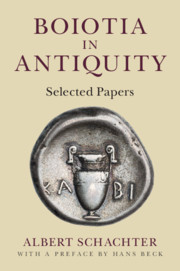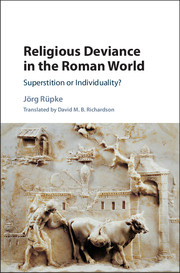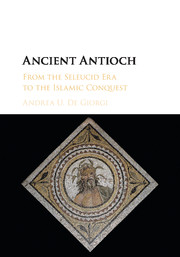Refine search
Actions for selected content:
23990 results in Ancient history

Boiotia in Antiquity
- Selected Papers
-
- Published online:
- 05 May 2016
- Print publication:
- 16 May 2016

Religious Deviance in the Roman World
- Superstition or Individuality?
-
- Published online:
- 05 May 2016
- Print publication:
- 16 May 2016

Ancient Antioch
- From the Seleucid Era to the Islamic Conquest
-
- Published online:
- 05 May 2016
- Print publication:
- 03 May 2016
Chapter Six - The people of Antioch
-
- Book:
- Ancient Antioch
- Published online:
- 05 May 2016
- Print publication:
- 03 May 2016, pp 163-177
-
- Chapter
- Export citation
Chapter Three - The plain of Antioch and the Amuq Valley
-
- Book:
- Ancient Antioch
- Published online:
- 05 May 2016
- Print publication:
- 03 May 2016, pp 66-96
-
- Chapter
- Export citation
Maps
-
- Book:
- Ancient Antioch
- Published online:
- 05 May 2016
- Print publication:
- 03 May 2016, pp xiii-xiv
-
- Chapter
- Export citation
Introduction
-
- Book:
- Ancient Antioch
- Published online:
- 05 May 2016
- Print publication:
- 03 May 2016, pp 1-12
-
- Chapter
- Export citation
Bibliography
-
- Book:
- Ancient Antioch
- Published online:
- 05 May 2016
- Print publication:
- 03 May 2016, pp 201-216
-
- Chapter
- Export citation
Conclusions
-
- Book:
- Ancient Antioch
- Published online:
- 05 May 2016
- Print publication:
- 03 May 2016, pp 178-182
-
- Chapter
- Export citation
Chapter Four - The highlands of Antioch
-
- Book:
- Ancient Antioch
- Published online:
- 05 May 2016
- Print publication:
- 03 May 2016, pp 97-132
-
- Chapter
- Export citation
Figures
-
- Book:
- Ancient Antioch
- Published online:
- 05 May 2016
- Print publication:
- 03 May 2016, pp ix-xii
-
- Chapter
- Export citation
Chapter Five - The archaeology of the western Antiochene
-
- Book:
- Ancient Antioch
- Published online:
- 05 May 2016
- Print publication:
- 03 May 2016, pp 133-162
-
- Chapter
- Export citation
Abbreviations
-
- Book:
- Ancient Antioch
- Published online:
- 05 May 2016
- Print publication:
- 03 May 2016, pp xv-xviii
-
- Chapter
- Export citation
Dedication
-
- Book:
- Ancient Antioch
- Published online:
- 05 May 2016
- Print publication:
- 03 May 2016, pp v-vi
-
- Chapter
- Export citation
Index
-
- Book:
- Ancient Antioch
- Published online:
- 05 May 2016
- Print publication:
- 03 May 2016, pp 217-226
-
- Chapter
- Export citation
Copyright page
-
- Book:
- Ancient Antioch
- Published online:
- 05 May 2016
- Print publication:
- 03 May 2016, pp iv-iv
-
- Chapter
- Export citation
Chapter Two - Foundation and growth of the city
-
- Book:
- Ancient Antioch
- Published online:
- 05 May 2016
- Print publication:
- 03 May 2016, pp 34-65
-
- Chapter
- Export citation
Contents
-
- Book:
- Ancient Antioch
- Published online:
- 05 May 2016
- Print publication:
- 03 May 2016, pp vii-viii
-
- Chapter
- Export citation
Notes
-
- Book:
- Ancient Antioch
- Published online:
- 05 May 2016
- Print publication:
- 03 May 2016, pp 183-200
-
- Chapter
- Export citation
Chapter One - Archaeologists and the Sanjak
-
- Book:
- Ancient Antioch
- Published online:
- 05 May 2016
- Print publication:
- 03 May 2016, pp 13-33
-
- Chapter
- Export citation
